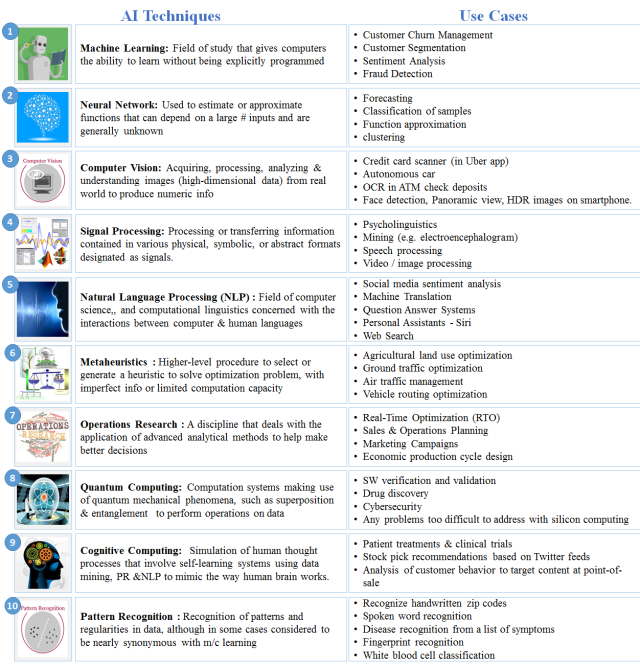Artificial Intelligence Use Cases & Technologies
*Get your crypto project/offer published on this blog and news sites. Email:contact@cryptoexponentials.com
The artificial intelligence (AI) market is estimated to grow from $0.42bn in 2014 to $5bn by 2020, at a CAGR of 54%. In another report, BofA Merrill reckons the market will blossom to $153bn over the next five years – $70bn for artificial intelligence-based systems, and $83bn for robots. That compares to roughly $58bn in 2014. This growth can be attributed to the factors such as diversified application areas, improved productivity, and increased customer satisfaction.
With recent advances, AI is gaining confidence to drive business growth. In this blog, I have taken a close look at inventory of AI Techniques / Technologies and applicable use cases. The following chart provide “Artificial Intelligence – Techniques & Use Cases” snapshot.

Recommended Reading
Atlas of AI: Power, Politics, and the Planetary Costs of Artificial Intelligence
The hidden costs of artificial intelligence, from natural resources and labor to privacy, equality, and freedom
“This study argues that [artificial intelligence] is neither artificial nor particularly intelligent. . . . A fascinating history of the data on which machine-learning systems are trained.”—New Yorker
“Eloquent, clear and profound—this volume is a classic for our times.”—Geoffrey C. Bowker, University of California, Irvine
What happens when artificial intelligence saturates political life and depletes the planet? How is AI shaping our understanding of ourselves and our societies? Drawing on more than a decade of research, award‑winning scholar Kate Crawford reveals how AI is a technology of extraction: from the minerals drawn from the earth, to the labor pulled from low-wage information workers, to the data taken from every action and expression. This book reveals how this planetary network is fueling a shift toward undemocratic governance and increased inequity. Rather than taking a narrow focus on code and algorithms, Crawford offers us a material and political perspective on what it takes to make AI and how it centralizes power. This is an urgent account of what is at stake as technology companies use artificial intelligence to reshape the world.






